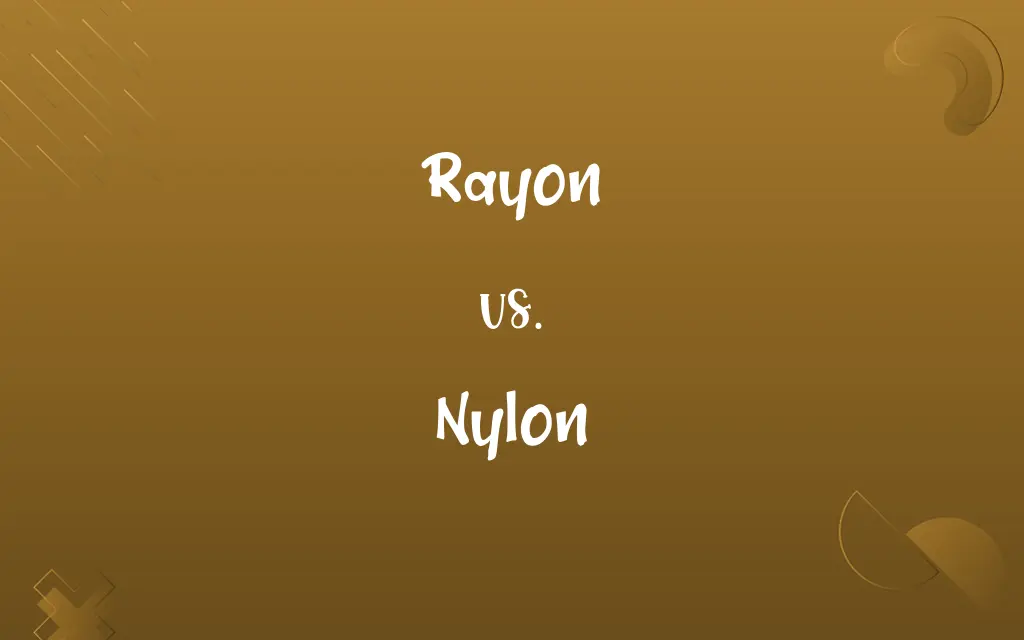Rayon vs. Nylon: Know the Difference

By Shumaila Saeed || Updated on December 25, 2023
Rayon is a semi-synthetic fiber made from regenerated cellulose, often resembling silk, while Nylon is a fully synthetic polymer known for its strength and elasticity.

Key Differences
Rayon, a semi-synthetic fabric, is made from cellulose fibers derived from wood pulp, giving it a soft, comfortable feel akin to natural fibers. Nylon, on the other hand, is a fully synthetic polymer, initially designed as a synthetic replacement for silk, known for its exceptional strength and durability.
Shumaila Saeed
Dec 18, 2023
The production process of Rayon involves dissolving cellulose in chemicals and then spinning it to form fibers, making it more eco-friendly compared to fully synthetic fibers. Nylon is produced through a chemical process involving petroleum products, resulting in a material that is both lightweight and resistant to wear and tear.
Shumaila Saeed
Dec 18, 2023
Rayon is celebrated for its ability to blend well with other fibers and its excellent drape and absorbency, making it a popular choice for comfortable clothing. Nylon is renowned for its high elasticity and abrasion resistance, which makes it ideal for use in items like sportswear and outdoor gear.
Shumaila Saeed
Dec 18, 2023
Rayon tends to wrinkle easily and can be more delicate, requiring careful handling and maintenance. Nylon, conversely, is known for being wrinkle-resistant and easy to care for, often used in items that require minimal maintenance.
Shumaila Saeed
Dec 18, 2023
In terms of environmental impact, the manufacturing process of Rayon, though involving natural materials, can sometimes involve harmful chemicals, while Nylon's production is more energy-intensive and relies on non-renewable resources.
Shumaila Saeed
Dec 18, 2023
ADVERTISEMENT
Comparison Chart
Material Origin
Semi-synthetic, made from cellulose
Fully synthetic, made from petroleum products
Shumaila Saeed
Dec 18, 2023
Environmental Impact
Uses natural materials but can involve harmful chemicals
Energy-intensive, relies on non-renewable resources
Shumaila Saeed
Dec 18, 2023
Care and Maintenance
Wrinkles easily, requires careful handling
Wrinkle-resistant, easy to care for
Shumaila Saeed
Dec 18, 2023
Common Uses
Clothing, bedding, fashion items
Sportswear, outdoor gear, industrial uses
Shumaila Saeed
Dec 18, 2023
ADVERTISEMENT
Rayon and Nylon Definitions
Rayon
Rayon is known for its silk-like feel and beautiful drape.
This scarf drapes so well since it's Rayon.
Shumaila Saeed
Dec 10, 2023
Nylon
Nylon is resistant to abrasions and damage.
Nylon ropes are used for climbing due to their resistance to wear.
Shumaila Saeed
Dec 10, 2023
Rayon
Rayon can be more delicate and prone to wrinkling.
Handle this Rayon blouse gently to avoid wrinkles.
Shumaila Saeed
Dec 10, 2023
Nylon
Nylon is a durable, synthetic polymer, ideal for tough materials.
These hiking boots are sturdy because they're made with Nylon.
Shumaila Saeed
Dec 10, 2023
Rayon
Rayon is a versatile, semi-synthetic fabric made from regenerated cellulose.
The dress's smooth texture is because it's made of Rayon.
Shumaila Saeed
Dec 10, 2023
ADVERTISEMENT
Nylon
Nylon is known for its high strength and elasticity.
This backpack is durable and stretchable, thanks to Nylon.
Shumaila Saeed
Dec 10, 2023
Rayon
Rayon is absorbent and blends well with other fibers.
These towels are absorbent because they're a cotton-Rayon blend.
Shumaila Saeed
Dec 10, 2023
Nylon
Nylon is a low-maintenance fabric, often used in sportswear.
My gym clothes are mostly made of Nylon for easy care.
Shumaila Saeed
Dec 10, 2023
Rayon
Rayon is a breathable fabric, making it comfortable for warm weather.
I prefer wearing Rayon shirts in summer for their breathability.
Shumaila Saeed
Dec 10, 2023
Nylon
Any of a family of high-strength, resilient synthetic polymers, the molecules of which contain the recurring amide group CONH.
Shumaila Saeed
Dec 10, 2023
Rayon
Any of several synthetic textile fibers produced by forcing a cellulose solution through fine spinnerets and solidifying the resulting filaments.
Shumaila Saeed
Dec 10, 2023
Nylon
Originally, the DuPont company trade name for polyamide, a copolymer whose molecules consist of alternating diamine and dicarboxylic acid monomers bonded together; now generically used for this type of polymer.
Shumaila Saeed
Dec 10, 2023
Nylon
(in the plural) A stocking originally fabricated from nylon; also used generically for any long, sheer stocking worn on a woman's legs.
I tore a hole in my nylons while walking home through the woods.
Shumaila Saeed
Dec 10, 2023
Rayon
A synthetic fiber, made of thin filaments of regenerated cellulose, extruded from a solution of viscose. Called also viscose fiber and viscose rayon fiber.
Shumaila Saeed
Dec 10, 2023
Nylon
(perjoratively, by comparison to silk) A Queen's Counsel, King's Counsel or Senior Counsel who was appointed as a courtesy, rather than on merit.
Shumaila Saeed
Dec 10, 2023
Nylon
Any of several thermoplastic polyamide plastics, comprising a family of high-strength resilient synthetic materials, used mostly in fibers.
Shumaila Saeed
Dec 10, 2023
Nylon
Stockings made of a thin form of nylon{2}, especially full-length stockings either sheer of of varying shades.
Shumaila Saeed
Dec 10, 2023
Nylon
A thermoplastic polyamide; a family of high-strength resilient synthetic materials
Shumaila Saeed
Dec 10, 2023
Nylon
Nylon dries quickly and retains its shape.
This Nylon jacket is great for rainy days as it dries fast.
Shumaila Saeed
Dec 10, 2023
Repeatedly Asked Queries
What is Rayon?
Rayon is a synthetic fiber made from natural cellulose, typically derived from wood pulp or cotton.
Shumaila Saeed
Dec 18, 2023
What are the characteristics of Rayon?
Rayon is known for its softness, breathability, and drapability. It closely resembles the feel of natural fibers like cotton or silk.
Shumaila Saeed
Dec 18, 2023
Is Rayon biodegradable?
Yes, Rayon is biodegradable because it is made from natural cellulose fibers.
Shumaila Saeed
Dec 18, 2023
Is Rayon prone to wrinkles?
Rayon can be prone to wrinkles but can often be treated with proper care and ironing.
Shumaila Saeed
Dec 18, 2023
What are the properties of Nylon?
Nylon is lightweight, strong, and has good elasticity. It is also resistant to moisture and chemicals.
Shumaila Saeed
Dec 18, 2023
Is Rayon a natural or synthetic fiber?
Rayon is considered a semi-synthetic fiber because it is derived from natural sources but undergoes chemical processing.
Shumaila Saeed
Dec 18, 2023
Is Rayon moisture-wicking?
Rayon has moderate moisture-wicking properties, making it comfortable to wear in warm weather.
Shumaila Saeed
Dec 18, 2023
What is Nylon?
Nylon is a synthetic polymer known for its strength, durability, and resistance to abrasion.
Shumaila Saeed
Dec 18, 2023
What are the common uses of Rayon?
Rayon is used in clothing, textiles, and home furnishings due to its comfort and versatility.
Shumaila Saeed
Dec 18, 2023
Can Rayon shrink when washed?
Yes, Rayon can shrink when exposed to water and heat, so it may require special care during washing.
Shumaila Saeed
Dec 18, 2023
Is Rayon environmentally friendly?
The environmental impact of Rayon production varies, but some methods of production are more eco-friendly than others.
Shumaila Saeed
Dec 18, 2023
Is Nylon waterproof?
Nylon itself is not waterproof, but it can be treated or coated to make it water-resistant or waterproof.
Shumaila Saeed
Dec 18, 2023
Is Rayon flame-resistant?
Rayon is not naturally flame-resistant but can be treated to improve its fire resistance.
Shumaila Saeed
Dec 18, 2023
Who invented Nylon?
Nylon was invented by Wallace Carothers, a chemist at DuPont, in the late 1930s.
Shumaila Saeed
Dec 18, 2023
Is Nylon recyclable?
Nylon can be recycled, and many programs exist for recycling nylon products into new materials.
Shumaila Saeed
Dec 18, 2023
What are the common uses of Nylon?
Nylon is used in a wide range of applications, including clothing, ropes, fishing lines, car parts, and stockings.
Shumaila Saeed
Dec 18, 2023
Is Nylon stretchy?
Nylon can have some stretch, depending on its specific type and weave.
Shumaila Saeed
Dec 18, 2023
Is Nylon biodegradable?
Nylon is not biodegradable and can persist in the environment for a long time.
Shumaila Saeed
Dec 18, 2023
Is Nylon resistant to UV radiation?
Nylon can degrade when exposed to prolonged sunlight, so it may not be highly UV-resistant without special treatment.
Shumaila Saeed
Dec 18, 2023
Can Nylon be dyed easily?
Nylon can be dyed, and it tends to retain color well, making it popular for vibrant clothing and accessories.
Shumaila Saeed
Dec 18, 2023
Share this page
Link for your blog / website
HTML
Link to share via messenger
About Author
Written by
Shumaila SaeedShumaila Saeed, an expert content creator with 6 years of experience, specializes in distilling complex topics into easily digestible comparisons, shining a light on the nuances that both inform and educate readers with clarity and accuracy.








































































